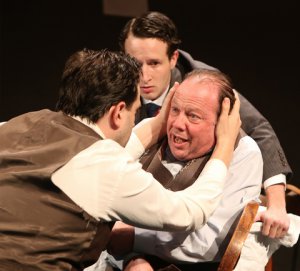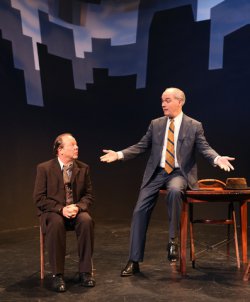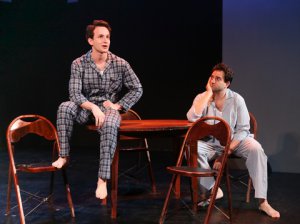Death of a Salesman in Yiddish
Powerful revival of the Miller classic with Avi Hoffman as Willy Loman works remarkably well in Yiddish with the characters’ ethnicity made explicit.

Daniel Kahn as Biff , Lev Hershkovitz as Happy and Avi Hoffman as Willy in a scene from New Yiddish Rep’s “Death of a Salesman” in Yiddish (Photo credit: Ronald L. Glassman)
[avatar user=”Victor Gluck” size=”96″ align=”left” ] Victor Gluck, Editor-in-Chief[/avatar] Although Arthur Miller grew up in a Jewish family, none of his characters with the exception of the antique dealer in The Price are explicitly Jewish. Yiddish stage star Joseph Buloff sought to correct that when he adapted Death of a Salesman as Toyt fun a Seylsman and presented the play in Argentina in 1949. In 1951, Miller permitted Buloff to bring the translation to Brooklyn’s Parkway Theatre where it was deemed a great success. Not seen again in New York until now, New Yiddish Rep is giving the Yiddish adaptation its Manhattan premiere in a slightly revised version in which the non-Jewish characters speak in English and the text is projected with English supertitles for a contemporary audience that does not know Yiddish.
Director Moshe Yassur, who also directed the Yiddish Waiting for Godot, states in the program notes that he chose to focus on the play’s subtitle, “Certain Private Conversations in Two Acts.” As a result the production strips the play of all scenic theatricality and uses nothing more than a table and four chairs, with the characters entering and exiting into the shadows. The effect of this is both to emphasize that the play is taking place mostly in Willy Loman’s mind and that it focuses on the intimate, late night conversations between this classically dysfunctional family. In this production, the scenery is not missed and the encounters between Willy, Linda, Biff, Happy and the associates that Willy visits take precedence. Yassur’s Death of a Salesman is a fresh minimalist version of the play that allows the audience to pay attention to the arguments and lies that the Lomans tell each other, deepening the inevitable tragedy.

Avi Hoffman as Willy and Shane Baker as Charley in a scene from “Death of a Salesman” in Yiddish (Photo credit: Ronald L. Glassman)
Death of a Salesman depicts the last 24 hours in the life of 62-year-old Willy Loman, a traveling salesman who is both failing in health and falling down in his work, who has always lived with false dreams of success, who always though it was enough to be well liked. As he begins to fall apart, he relives scenes from his earlier life such as the visit of his fabulously successful bother Ben and when his son Biff, a high school football hero, gets to play at Ebbets Field. But he also recalls troubling memories that he would rather go on repressing. Unfortunately, he has corrupted both of his sons: Biff, who had a great deal of promise, has not been able to find himself after discovering the phoniness of his father’s values, and has become a drifter who has spent time in jail. Younger son Happy, an assistant buyer, is so self-centered and hedonistic that now in his early thirties he is still unable to settle down. Patient wife and mother Linda builds up her men by telling them what they want to hear as she keeps things going. The play is a scathing condemnation of the failure of the American Dream that looks for easy, unearned success and takes appearances for reality.
Unlike the recent actors who have played Willy Loman in Broadway revivals, Avi Hoffman looks the right age to be the aging, played-out protagonist. With his hunched shoulders and his permanent frown, his Willy has the weariness and demoralization that sums up the character when we meet him. However, when he straightens up and smiles he loses 20-30 years and becomes the young man that Willy imagines himself to still be. His arguments with his son Biff when he refuses to hear the truth about their lives are potent in a very disturbing way. Hoffman’s Willy Loman is a powerful portrait of a man at the end of his rope, a man who has always lived by lies and self-deception. As his wife Linda, Suzanne Toren is the eternal optimist building up her men, until after the final betrayal of her sons Biff and Happy in the second act, she lets loose and tells them exactly what she thinks of them, demonstrating that she saw through them all along.
The Biff and Happy of Daniel Kahn and Lev Herskovitz, respectively, could not be more different and make a dramatic contrast as to how the two brothers have developed. Kahn’s Biff is confused, troubled and depressed, and unlike his father and brother, he is fully aware that he has been a failure. Herskovitz’s Happy, true to his name, is always making unrealistic plans, lying through his teeth, and turning his meager existence into the stuff of dreams. Shane Baker brings great dignity to Willy’s next-door-neighbor Charley who has been giving him handouts for years. As Howard Wagner, Willy’s boss, Adam Shapiro offers a hail fellow well met attitude that explains his being oblivious to the older man’s problems.

Lev Herskovitz as Happy and Daniel Kahn as Biff in a scene from New Yiddish Rep’s “Death of a Salesman” in Yiddish (Photo credit: Ronald L. Glassman)
As Biff’s childhood friend and next-door neighbor, Ben Rosenblatt’s Bernard is credible both as the successful lawyer in the present and as the studious classmate he was 15 years ago. Amy Coleman has the right touch of coarseness and vulgarity as the other woman in Willy’s life on the road. Shayna Schmidt has just enough glamor as the cover girl that Happy picks up in the restaurant scene. As the waiter at Franks’ Restaurant, Ilan Kwittken is ironically the only character to express concern and compassion for the aging Willy. The only poor casting is Itzy Firestone as Willy’s hero Uncle Ben played here as an elderly man, when it fact we only see him in Willy’s flashbacks when he would have been young and vigorous, a man who walked into the jungle at 17 and came out a millionaire. Even if this is a false dream, he would have appeared larger in Willy’s imagination.
Gina Healy’s costumes are redolent of the late 1940’s when people without much money were still wearing their outfits from the previous decade and clothes had been allowed to get shabby. The original music and sound design by Ellen Mandel with its clarinet solos by Michael Winograd beautifully set the somber note of the play. Mark Marcante’s minimalist set (which works for all of the locales) also includes an abstract skyline of New York which hovers over the set and the theater. The lighting by Gertjan Houben strikes the right balance of light and dark to make the transitions from the present to the past memories successful. The excellent supertitles translation and design is by Kahn, also onstage as Biff.
New Yiddish Rep’s Death of a Salesman in Yiddish adds a new dimension to this well-known Arthur Miller tragedy. With the English language supertitles it becomes accessible to a non-Yiddish speaking audience. The use of Yiddish gives the play an intimacy that it doesn’t ordinarily have, as though we were watching a cinéma vérité film. While not ostensibly written as a Jewish family, this version makes absolutely clear the universality of the play while at the same time placing it in the milieu that Miller was obviously writing about.
Death of a Salesman in Yiddish (through November 22, 2015)
New Yiddish Rep in association with Castillo Theatre
Castillo Theatre, 542 W. 42nd Street, in Manhattan
For tickets, call 866-811-4111 or visit http://www.newyiddishrep.org
Running time: two hours and 45 minutes including one intermission






Leave a comment